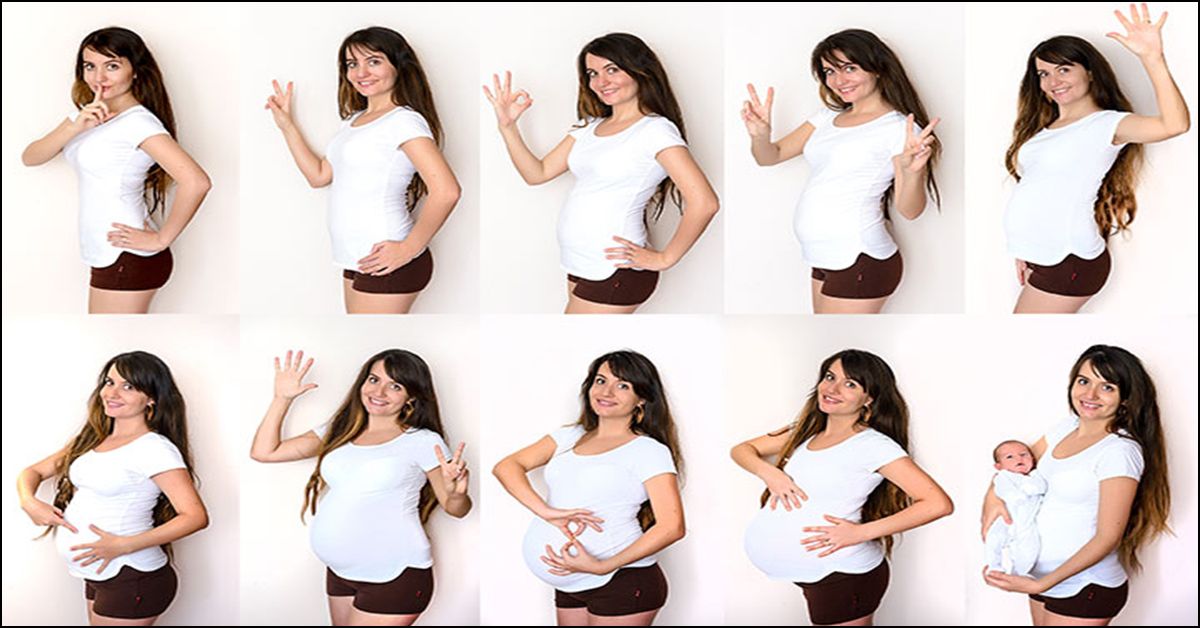
First month
It is almost impossible to pinpoint when fertilisation happens exactly, which then initiates your pregnancy. Therefore, the first week of gestation would be considered the last week of your last period.
The already fertilised embryo (your future baby) is on its way to the uterus and implants itself there about 7-9 days after ovulation. At this stage, the embryo is 6-8 days old. Thus begins the release of the hormone beta-hCG, which is the hormone detected by pregnancy tests.
It is possible that, due to the increase in this hormone, you may begin to notice some symptoms in this first month (exhaustion, hormonal swings…), but generally in a very soft and practically imperceptible way. It won't be until you miss your next period (and confirm the presence of the beta-hCG hormone with a pregnancy test) that you will truly be aware that you are pregnant!
When you have confirmation of your pregnancy, start thinking about which medical-professional figure you want to be followed by: a public facility (perhaps a medical centre, where both midwives and gynaecologists work) or a private facility. In any case, ask for advice on the next steps to follow and on the intake of calcium, iron, folic acid and vitamin C. [learn more about mother’s body changes] and [learn more about a mother's diet].
Second month
During the second month, organogenesis begins: the spinal cord, brain, intestines and skin begin to form. Eyes, ears, nose and upper lip also appear. It is a month of marvellous evolution in which the embryo begins to acquire human form.
This month is also important because the heart is formed.
The changes in your body are not yet visible; your "bump" is not noticeable yet, although you may already start to feel some symptoms such as nausea, vomiting, tiredness… Each mother and pregnancy shows different symptoms!
Third month
From this month onwards, the embryonic period ends and your baby is called a foetus. Your future baby has already developed all its organs, even if, at the moment, they are not yet fully formed.
During these 4 weeks, the foetus grows up to 7 cm and will reach a weight of about 15-20 gr (like a spoonful of salt). It's normal and healthy for you to start gaining weight. In this 3rd month; your weight gain is approximately 10% of the total weight you will gain during pregnancy.
Your future baby's movement during this month is quite intense: curling his fingers, kicking, pursing his lips, etc.
By the end of this month, symptoms caused by the beta-hCG hormone (such as nausea or vomiting) may be greatly reduced as levels of this hormone stabilise; moreover, after three months the risk of spontaneous abortion decreases considerably.
Usually within this month (week 12) you will have your first ultrasound… and you will finally see your baby! (However, it will be too soon to know his gender)
Fourth month
In this month the foetus is covered in fluff, a very fine hair which has the function of preserving the heat of the little body.
The vocal cords are formed and when your baby is born he will cry (or he is provoked to cry) to check his lungs and airways are clear, his vocal cords are functioning and he is healthy.
In the fourth month, the foetus's eyes are particularly large, even if they remain closed. They are distant from each other, but the face is already well defined and the neck that separates the head from the rest of the body can be clearly distinguished. His muscles are able to perform the sucking movement, and so the baby can suck on his little thumb. Teeth begin to erupt, although this is only the beginning of a long process. The outer ear moves up.
Skin folds appear on the palms and fingers…your baby already has a fingerprint!
The size of the foetus at the beginning of this month is 8.5 cm in length and can develop up to 18 cm. HIs weight will be approximately 150-170 gr (like a medium sized pear).
Generally in this month (from the sixteenth week onwards), you will be able to feel a slight movement... it’s your baby who moves and greets you with little kicks! It's important to know this foetal "restlessness" and his patterns so you can monitor the health of your baby. If in doubt, ask your doctor to help you to understand how to monitor your baby’s vitality.
Fifth month
The structure of the heart is almost completely defined and the heart is already beating strongly (at a faster rate than an adult’s). The sense of taste sharpens as a result of the development of the taste buds. Also, the baby begins to perceive sounds and lights.
In the last weeks of this fifth month of pregnancy, the second layer of teeth is created.
Milk teeth have already formed inside the dental sockets and will remain "at rest under the gums" until the child is five/sixth months old.
The brain is already practically the same as it will be when its formation is completed and once your baby is born; moreover, millions of neurons are formed.
The belly button may flatten or start popping. In this case, it will return "to its place" after childbirth.
You will notice that when you lie down, the foetus moves much more and with more energy. This is because the baby fits better in the pelvis when standing.
By the end of this month, the baby can reach about 22-25 cm.
The uterus will move up to above navel height to make room for it.
You should no longer feel nauseous or vomiting, although you may have other discomforts, such as heartburn or nasal congestion because your digestion has slowed down, as well as the baby's position changing and the pressure he puts on you.
In this month (in your 20th week of gestation) you will have the opportunity to see your baby again on an ultrasound… and, if you wish, to discover his gender!
Sixth month
Your baby already has eyebrows, hair and eyelashes.
His muscles are also formed and, thanks to this and the length of the umbilical cord, he can move with more energy than before… you'll feel it more often and with more determination!
Furthermore, by clearly recognizing sounds, he responds perfectly to vocal prompts, such as music and your voice.
The baby's skin begins to become dull, taking on a certain texture.
The child can open and close his eyes and make gestures such as sticking out his tongue.
Different parts of the baby's body can be felt through the abdominal wall. The proportions of the body begin to be equal in relation to the head. He looks more and more like your future newborn.
The evolution of the child develops from about 27 cm to 32 cm, and from the weight of about 450 grams to about 750-1000 grams (a small melon).
The second trimester is over and the state of gestation is already evident.
Your bump should be big enough by now because the weight of the foetus is increasing, so you may feel tired, have back pain and be uncomfortable in certain positions.
Seventh month
The last trimester of pregnancy begins.
Foetal development is already well advanced. It's normal to feel more tired and heavy. Also, you may have more difficulty sleeping or doing certain movements such as tying shoelaces or bending over. Your feet and ankles tend to swell. Ask your doctor about drainage massages, which can safely deflate your ankles, legs and feet.
During this time, the foetus's lungs develop and the skeleton becomes more substantial. In addition, baby fat is already starting to accumulate in the body, which will allow him to control his temperature after birth.
In this month, the length of the foetus varies from about 33 cm to 38 cm and can weigh up to about 1100-1300 grams (like a pineapple).
Due to this significant increase in weight and length, the baby's movements begin to be more restricted. It is more pressed against the bladder, so you will notice it not only in the movements of the foetus, but also in your frequent need to urinate.
We suggest you start thinking about packing your suitcase for the hospital, which will help both you and your child... there's time, but it's good to plan ahead!
Eighth month
The baby continues to gain weight and size. During this month, he will reach up to 50% of his total pregnancy weight.
Your baby's lungs are nearly developed, which means they take up more space.
It will be normal if you have more difficulty sleeping and moving because of the size of your bump. It is also normal that you want to rest more often… try to listen to your body!
In this month, olfactory neurons are being created, a sign that the brain is also evolving.
The baby's first hiccup begins. The cause is that he is ingesting amniotic fluid; you will feel small jolts. Do not be alarmed and relax… they will pass within a few minutes.
At this stage you may feel some heartburn or constipation (or you may have had them already, considering that each pregnancy is different). All of these symptoms are very common and are due to the increase of progesterone in your body. There's no need to be alarmed. Try to relax and, if uncomfortable, talk to your doctor.
Your gestation stage is very advanced, so you have to take care of yourself, but without interrupting your life.
Ninth month
The baby descends into the pelvis and the head begins to attach itself to it. The stomach and intestines are already working.
As we have already said, for a few weeks the movements of the foetus have been less frequent due to the increase in size and weight of the foetus, but this does not mean that the movements of your baby are not felt every single day. Now the more abrupt movements are felt as well, as if they were kicks.
At the end of this month the foetus should measure about 43 cm and its weight increases during this time from about 1980 g to about 2730 g on average (like a small red watermelon).
The head will move downward during these weeks, preparing for delivery, and you will be able to distinguish perfectly between a foot, a back or a hand. The nails have already grown to cover all of her fingers.
The baby is able to breathe and perform sucking and swallowing movements at the same time, which will allow him to feed on mother's milk at the time of birth. He's also starting to produce his blood.
The baby measures between 45 cm and 55 cm, and weighs on average between 2520 and 3670 g.
You may feel strong contractions [learn more about contractions]. These are the so-called preparation contractions.
The loss of the amniotic plug and the breaking of the waters can signify that the birth can occur at any time. You must be ready to go to the hospital immediately.


